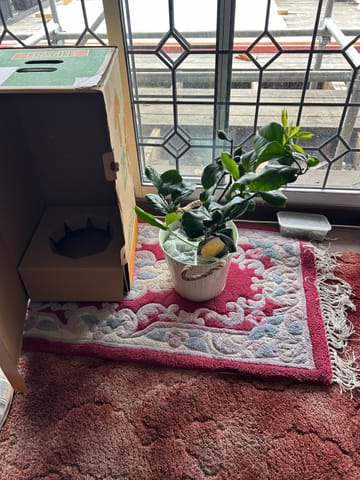Lemon Meyer Bush
In stock


- Strong British Grown Lemon bushes
- This popular 'Meyer' variety is prized for it's sweet and juicy fruits and fragrant flowers
- Next or named day delivery just £6
Grown in Sussex, these superb bushy plants are always popular and they are looking lovely again this week, with a few green or ripening yellow fruits.
Perfect for a sunny windowsill, they will also enjoy a sheltered patio, once the weather is a little warmer. Meyer fruit are sweeter and more aromatic than a regular lemon, making them a great gift for a keen cook or cocktail maker.
Over time they will grow on into a larger bush shape, producing more and more lemons and fragrant blossom, year after year.
 4.8/ 5
110 reviews
4.8/ 5
110 reviews





Excellent plant delivered safely and on the date requested

Brilliant and good value

it was a lovely lemon tree. My friend was delighted with it, as I was. It surpassed expectations.

Fantastic mother's day present

Beautiful planta, and perfect for a present!

For inexperienced plant buyers this was well documented to help with purchase. Delivered with care and a beautiful lemon tree already carrying lemons.

This was a perfect birthday present for my daughter who had wanted a lemon tree for a long time. It was delivered promptly, as arranged, in perfect condition.

Perfect tree

I am delighted with this company, they resolved an issue without any delay and the Lemon Bush my daughter received is just beautiful.

Plant in excellent condition and well packed.

These instructions are sent with the plant gift
This lemon tree is a variety called ‘lemon Meyer’ and has both tasty fruit and fragrant flowers. It can bring pleasure for years, with the right care.
Citrus trees need lots of light. A conservatory is ideal, but they will also be happy near a window in a cool, bright room. In the summer and autumn, your citrus will thrive outdoors in full sun or partial shade. However, these trees are not hardy and will need to come inside as soon as the outdoor temperatures are near 5 degrees Celsius. When indoors, try to keep your plant away from cold draughts and any heating source.
Citrus are best kept in small pots here in the UK, they will need to be monitored regularly to check when the topsoil is dry. It is best not to have them on a routine water and let them tell you when they are next ready for a drink. When the topsoil is bone dry, remove the pot from the outer pot cover. Water thoroughly from the top until excess water drains right through the pot and out of the bottom and never leave your plant sitting in water. Sometimes if the soil is very compact this may take several waterings and is easiest to do in a kitchen sink. In the winter you should expect to water thoroughly still, making sure to soak the soil, but you might only need to do this once from anything between 1 to 4 weeks, depending on how quickly the soil dries out. In the summer months you may need to water every other day, but do not stand your plant in water. Don't worry if the soil feels dry between waterings, but if the leaves start to droop or curl you know it is thirsty, so water straight away. If you are having gradual leaf drop where you have a few leaves falling off each day, your plant is being overwatered.
In the summer, citrus trees will benefit from summer citrus feed every week to encourage growth, We use our Summer citrus fertiliser from March until the end of September. Through winter, from October until the end of February, we use the winter citrus fertiliser every time we water.
Citrus grow quite slowly; if you need to, repot in the spring only going up 1 pot size using a fast-draining compost suitable for container plants. As a general rule, citrus tend to produce flowers in late spring followed by small green fruits that can take 10 months or more to fully ripen. However, in this country, many varieties don’t follow a strict season and can fruit or flower at any point during the year.
Problem Solving
Citrus trees are not the easiest of plants but they are very rewarding. Look out for signs of trouble and try to treat problems early. The most common problem is leaves dropping due to over or under-watering. If leaves are crisp when they drop, this is due to underwatering; if they are leathery the chances are it has been over-watered. A return to a regular and thorough watering routine should lead to recovery.
If new growth is very light in colour or has mottled markings your plant may be lacking trace elements. A good dose of citrus feed should soon green up the leaves.
Our citrus trees are grown in a pesticide-free environment. In the unlikely event that you find pests, e.g. aphids, these can be removed by hand or with a soap and water spray. Check our recommended organic plant pest treatment for other pests here
We also have several pages and a video on more detailed citrus care here
















